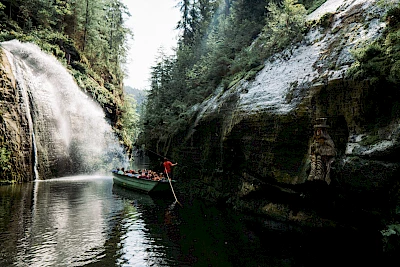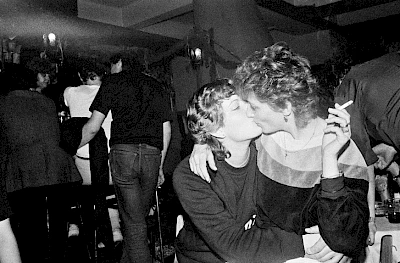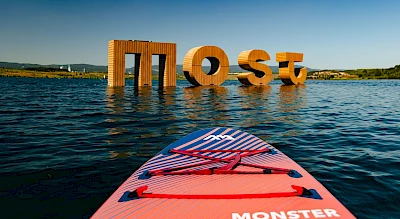Derweil in Tschechien... 32/25
22.08.2025
Edmundsklamm remains in operation until the beginning of November

Edmund's Gorge in Bohemian Switzerland has been open to visitors again for a month now. After three years of closure, the interest in a boat trip was enormous and has not waned to this day. In the first month, the municipality of Hřensko (Herrnskretschen) counted 4,000 visitors.
However, access is restricted. A personalized ticket is required for the visit, which can only be purchased for the same day at the tourist information office in Hřensko. In addition, initially only 50 people were allowed into the gorge each day and only if accompanied. This number was increased to 120 after the first week.
With the end of the Czech summer vacations at the end of August, the likelihood of acquiring one of the coveted tickets increases. There is time until the beginning of November. Before the devastating fire disaster in 2022, this was the traditional end of the boat trips. The municipality of Hřensko has now decided to keep the Edmundsklamm open until the latest possible date in the first season of the reopening. Only in bad weather will tickets not be sold.
A ticket costs 400 crowns (around 16 euros). It is personal and entitles the holder to enter at a set time. Admission includes an accompanied walk to the landing stage for the boats, including a boat trip and return to Hřensko via the same exit.
Czech Republic commemorates the suppression of the Prague Spring
The Czech Republic commemorated the 57th anniversary of the suppression of the Prague Spring on Thursday. President Petr Pavel warned against distorting the events of that time and called for the defense of the values that have accompanied humanity for a long time. In this context, he also referred to Russia's war against Ukraine, which Russia interprets as a defense of its own interests, just as the Soviet Union did in 1968.
On the night of August 21, 1968, units of the Soviet army and the armies of three other Warsaw Treaty states (Bulgaria, Poland, Hungary) invaded the territory of Czechoslovakia. The invasion had been finally decided three days earlier and was intended to stop the liberalization under party leader Alexander Dubček, which went down in history as "socialism with a human face".
Over 60 people fell victim to the invasion in the first few days. In the end, their number totaled 108, most of them in Prague and eastern Slovakia.
While the armies of Poland, Hungary and Bulgaria soon withdrew, the Soviet Union army remained in the country and even increased its presence to 750,000 soldiers. As a result of the invasion, all previously won freedoms were revoked. Hundreds of thousands lost their jobs and were forced to emigrate or go underground.
Documentary film is Czech Oscar hopeful

For the first time, the Czech Republic is sending a documentary film into the race for the Oscar for Best Foreign Language Film. The Czech Film and Television Academy chose the film "Ještě nejsem, kým chci být" (I am not yet who I want to be) by director Klára Tasovská. The film is about the life of Czech photographer Libuše Jarcovjáková, from the harsh underground of communist Czechoslovakia to exclusive photo shoots for fashion guides in Tokyo and her dramatic escape to West Berlin, where she witnessed the fall of the Iron Curtain. The film had its world premiere at the Berlinale 2024 and won the Czech Lion for Best Documentary that year. It was also screened last year in the presence of photographer Libuše Jarcovjáková to a sold-out audience at the Czech-German Culture Days in Dresden.
On December 16, it will be decided whether the film will be among the final 15. On January 22, 2026, it will be announced which five films have been officially nominated for the Oscars.
The last Czech Oscar success was almost 30 years ago. In 1996, the film "Kolja" by director Jan Svěrák won the Oscar for Best Foreign Language Film. 30 years earlier, "Obchod na korze" (The Shop in the Main Street, coming next year to Czech Film Wednesday) by directors Ján Kadár and Elmar Klos was the first Czechoslovak film to win the Oscar. Two years later, the prize went to Czechoslovakia for the second and last time for Jiří Menzel's "Ostře sledované vlaky" (Sharp Observed Trains).
Most is planning a cable car from the lake to Hněvín Castle

Lake Most near the town of the same name, Most (Brüx), may be the youngest open-cast mining lake in the Czech Republic to date, but the town is making rapid progress with its tourism infrastructure. One highlight was the Olympic Festival last summer, which drew the attention of the whole of the Czech Republic to the city and the lake. In the meantime, two new major projects are already being planned. To improve access from the city to the lake, the city is planning to build a pedestrian bridge from the regional museum to the lake shore. The older Matylda open-cast mining lake is also to be included in the bridge construction. So far, there is only one access to the lake near the Holy Trinity Church, where there are also parking spaces. Architectural designs are expected to be submitted by the beginning of 2026 at the latest. Construction is scheduled to begin in 2027, or 2028 at the latest. The city of Most is planning to finance the project with money from the State Fund for Transport Infrastructure.
The second project is the construction of a cable car to the local mountain Hněvín with the castle of the same name. As visitor numbers are increasing, the city hopes that a cable car will provide an elegant solution. The cable car will also have its valley station at the lake and thus connect two attractions - the lake and the castle. Users of the cable car who come by car will be able to park at the lake. To finance the cable car project, Most is hoping for money from the ČSA opencast mine revitalization fund, where coal mining will soon come to an end.
Free period products at Czech schools
From January 2026, all schools in the Czech Republic must be equipped with free period products in ladies' toilets. This is stipulated by an amendment to the hygiene guidelines of the Ministry of Health. Specifically, all schools attended by female pupils over the age of 9 are affected. The age limit was chosen to include all elementary school in the first stage. In the Czech Republic, the first stage runs from Year 1 to Year 5.
"Menstruation is not a matter of choice, but a natural part of life, and no schoolgirl should have to go home, improvise with toilet paper or be ashamed to ask for help because of it," said Health Minister Vlastimil Válek at the presentation of the new regulation.
The initiative is not only aimed at schoolgirls who are surprised by their period. It also applies to schoolgirls from poorer families who are often unable to afford sufficient period products.
While the Czech Republic is leading the way within the European Union with this initiative, the country still has one of the highest VAT rates on period products in the EU at 21 percent. In Germany, it is 7 percent. It is lowest in Ireland and the UK, where they are exempt from VAT.
Prague makes public transport more expensive
In Prague, local public transport will become more expensive from January. A one-way ticket for 30 minutes will then cost 39 crowns (around 1.60 euros) instead of the previous 30 crowns. A one-way ticket for 90 minutes will increase from 40 to 50 crowns (approx. 2 euros). Tickets will be slightly cheaper if you buy them via the Prague public transport app "Lítačka". Day and three-day tickets are also more expensive. The prices of monthly passes, subscription tickets and other season tickets for three months or the whole year remain unchanged.
The city management is selling the unpopular measure accordingly, as single or day tickets are mainly bought by tourists. Residents of Prague, on the other hand, mainly use season tickets for one month or the whole year.
The one-way tickets or day tickets are valid for subway trains, buses, streetcars and suburban trains within the city of Prague.
